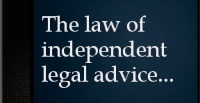
In the practice of estate litigation one of the most important aspects of each claim is to determine whether or not independent legal advice was provided where the transaction is suspect.
One of the leading decisions on independent legal advice is Gold v. Rosenberg (1997) 3 SCR with the Supreme Court of Canada stated the following at paragraphs 84-86:
“One can explain the necessity for independent legal advice in that case, by noting that Mrs. Bertolo was incapable without such advice of understanding any aspect of the transaction.
I need only quote from the Court of Appeal’s description of her at paragraph 579:
She has no business experience a little formal education. She is not fluent in English and is unable to read and discern such documents as promissory notes, collateral mortgages and financial statements.
Whether or not someone requires independent legal advice will depend on two principal concerns:
Whether they understand what is proposed to them, and whether they are free to decide according to their own will
The first is a function of information and intellect, while the second will depend amongst other things, and whether there is undue influence.
The court upheld the Ontario Court of Appeal decision that found that Mrs. Bertolo could not possibly have understood what she was agreeing to. The Ontario Court of Appeal held that she ought to have had independent legal advice and that she did not get it, first, because the lawyer she met work for the same firm that represented her son and the bank, and second because the nature and consequences of the transaction were not explained to her.”
7 Factors to Look For In Independent Legal Advice
1. The person taking advantage of the wealth transfer is present at the time, the advice is given or the time the documents are signed;
2. Some or all of the instructions of come from the person taking advantage from the transaction;
3. The lawyer does not have a full understanding of the client’s overall asset picture, and is unable to assess her to discuss the extent to which it will impoverish them;
4. The lawyer has any prior professional relationship with the person taking advantage;
5. The lawyer has a past or current personal relationship with the person taking advantage ( for example childhood friend, best friend her employer’s wife, etc.);
6. The lawyer is upon close scrutiny really acting for someone other than the client, or is acting in a joint retainer with the person taking advantage;
7. Any part of the fees are being paid by the person taking advantage under relationship rather than the client himself or herself




